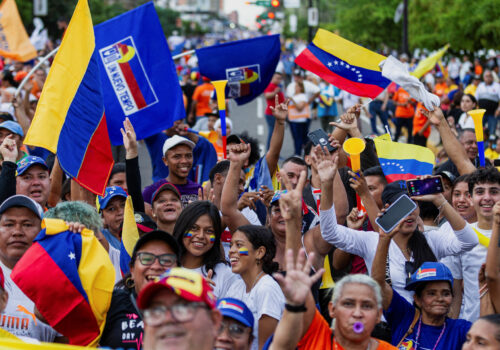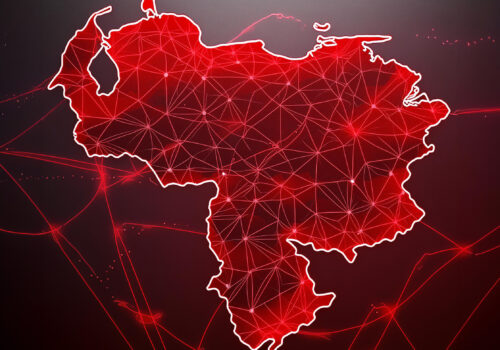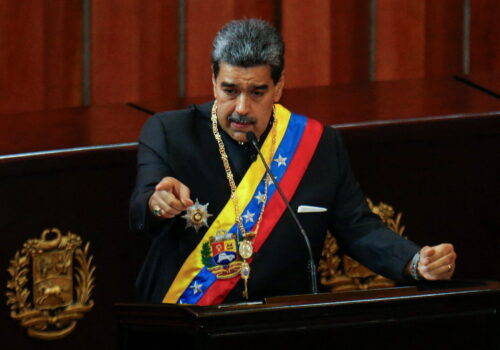Experts react: Maduro is clinging to power after a disputed election. What’s next for Venezuela?
Voting doesn’t make a democracy—legitimate and transparent counting of the votes does. On Sunday, Venezuelans went to the polls to select their next president. Early on Monday, the Nicolás Maduro-controlled election committee declared Maduro, who took over the presidency from Hugo Chávez in 2013, the winner of another six-year term. The announcement came in the face of widespread accounts of voter intimidation and other irregularities meant to deny victory to opposition candidate Edmundo González, who led in pre-election polling. “The Venezuelans and the entire world know what happened,” González said of the electoral committee’s dodgy results. Below, Atlantic Council experts sum up what to expect next in Venezuela and how the United States might respond.
Click to jump to an expert analysis:
Jason Marczak: The international community must apply pressure for a full, transparent vote count
Geoff Ramsey: Maduro is inviting the biggest loyalty test he’s faced in years
Iria Puyosa: A new cycle of heightened political turmoil looms over Venezuela
Diego Area: The world must stand with Venezuelans in their fight for free elections
The international community must apply pressure for a full, transparent vote count
The day after Venezuelans voted in massive numbers, it’s crystal clear that Maduro, a deeply unpopular authoritarian leader, was always going to claim electoral victory whether by hook or by crook. With most international observers banned from coming to the country to monitor the vote (except small United Nations and Carter Center delegations), the González campaign could only count on its own observers to verify results. The voting tabulations that opposition observers could verify (about 40 percent of the tabulations) showed González receiving 70 percent of the vote—a far cry from the 44 percent of votes that the country’s National Electoral Council claimed that González won.
It is important that the votes of the Venezuelan people are not an exercise in futility. Votes must be credibly counted. Here, it is imperative that the international community of democracies continue to resoundingly denounce fraud and take appropriate action. US Secretary of State Antony Blinken noted “serious concerns that the result announced does not reflect the will or the votes of the Venezuelan people.” Similar concerns have been raised in nearby Argentina, Chile, Costa Rica, Guatemala, Panama, Paraguay, Peru, Uruguay, Ecuador, and the Dominican Republic. European partners have also raised concerns. Even in Colombia, where President Gustavo Petro has maintained a close relationship with Maduro, Foreign Minister Luis Gilberto Murillo made a “call for the total vote count, its verification, and independent audit to be carried out as soon as possible.”
The international community must continue to exact pressure so that the will of the Venezuelan people can ultimately prevail. Not doing so would mean being complicit in the disenfranchisement of the Venezuelan people. But another six years of Maduro will also have reverberations, including new outward migration flows and new transnational criminal activity that will extend far beyond Venezuela’s borders.
—Jason Marczak is the vice president and senior director of the Atlantic Council’s Adrienne Arsht Latin America Center.
Maduro is inviting the biggest loyalty test he’s faced in years
More than twelve hours after polls closed, the fact that authorities still haven’t released the full vote count tells you everything you need to know about yesterday’s election. It seems that Maduro has decided to condemn Venezuela to six more years of conflict and isolation. Unless the government backs up its claim of victory with the full results and opens the count up to audits from observers, the international community has no choice but to respond with swift condemnation and diplomatic pressure.
This isn’t over yet. Maduro has to convince the ruling elite that he can keep things under control, but both he and the military know that he can’t govern a country in flames. He’s effectively inviting the biggest loyalty test he’s faced in years. I doubt Venezuelan elites are eager for six more years of repression, sanctions, and economic catastrophe. The opposition, under María Corina Machado’s leadership, has maintained unity and message discipline, and has the evidence in hand to document fraud and mobilize the public against Maduro’s blatant power grab. The role of the United States and its allies in Latin America and Europe will be crucial. It’s time for greater multilateral coordination in order to push the government to respect the will of the people and restore Venezuelans’ fundamental right to elect their leaders.
—Geoff Ramsey is a senior fellow at the Adrienne Arsht Latin America Center.
A new cycle of heightened political turmoil looms over Venezuela
The presidential elections in Venezuela turned out as forecasted: a high voter turnout, what appeared to be a decisive electoral win for the democratic opposition, and a blatant fraud that disregarded the will of the voters.
Due to the relatively small voting centers and the presence of witnesses from local communities, the population is convinced—as we’ve seen in an outpouring of messages and videos on social media—that González won in all electoral districts. This is strengthening the opposition’s unity and determination to continue its fight for the restoration of democracy.
Maduro’s loss of political legitimacy has left the ruling coalition vulnerable to increased instability. It will likely resort to further repression against the political opposition and organized civil society. The increase in information censorship in the week leading up to the elections is a clear sign of the severe restriction of civic space.
The democratic opposition, led by Machado, must aim to exploit divisions within the ruling coalition to weaken its power base. The Unitary Platform must also find ways to address public discontent without exposing the population to the violent repression experienced in 2017.
On the international front, Maduro is facing isolation from Latin American democracies, the United States, and Europe. Former allies, such as Brazil under President Luiz Inácio Lula da Silva and Colombia under Petro, were among the first to demand transparency in the election results. It now falls upon the United States to reevaluate the Qatar agreements. The negotiations would no longer be centered on electoral coexistence but rather on Chavismo’s exit from power after its defeat in the voting booths. The next six months will be a crucial period of intense conflict in Venezuela.
—Iria Puyosa is a senior research fellow at the Atlantic Council’s Digital Forensic Research Lab.
The world must stand with Venezuelans in their fight for free elections
No one thought it would be easy to remove an autocrat from power, but yesterday marked a new height in the Venezuelan government’s abuses to impede the will of the people. The people of Venezuela and their leadership have endured an epic journey to overcome obstacles and unite around the ideal of change. The disqualification of candidates like Machado and Corina Yoris, who represented genuine alternatives, and the subsequent voter suppression efforts and significant irregularities in the process, illustrate the regime’s determination to retain power at any cost.
Maduro’s actions to undermine the democratic process and steal this election pose grave consequences for the future of the country and have a direct impact on Latin America, the Caribbean, and the United States. By stifling free choice, the regime is not only eroding democratic institutions but also exacerbating the country’s humanitarian crisis. As a result, Venezuelans will continue to flee in search of opportunities and freedoms denied at home, contributing to an already critical migration crisis.
The world must stand with Venezuelans in their fight for a future where elections are not merely symbolic but are actual pathways to change. The integrity of the democratic process is crucial not only for Venezuela’s stability but also for the prosperity of the entire region.
—Diego Area is a deputy director at the Adrienne Arsht Latin America Center.
Further reading
Wed, Jul 24, 2024
Memo to the president: Seizing the opportunity for a democratic solution in Venezuela
Memo to... By
Venezuelans head to the polls for a presidential election July 28. Whether incumbent Nicolás Maduro or opposition candidate Edmundo Gonzalez Urrutia is declared the victor, the United States and its partners have a major opportunity to bring all parties together to negotiate a power-sharing agreement and restore the economically devastated country's democratic institutions.
Mon, Jul 22, 2024
How Venezuela became a model for digital authoritarianism
Report By
As Venezuelans head to the polls on July 28, the massive online surveillance apparatus developed under incumbent Nicolás Maduro watches street video, monitors social media and phone communications, and gathers data from online movements. What's behind this digital repression—and will it spread?
Thu, Apr 18, 2024
Experts react: The US just reimposed sanctions on Venezuela. What does this mean for energy markets and Venezuela’s election?
New Atlanticist By
The United States will reimpose oil sanctions on Venezuela, faulting Nicolás Maduro’s government for failing to uphold the October 2023 Barbados Agreement.
Image: Caracas, Venezuela.- In the photos, presidential candidate Nicolas Maduro, awaits the election results in Caracas, Venezuela on July 28, 2024. Maduro was re-elected on Sunday for a third consecutive six-year term with 5.15 million votes, reported the president of the National Electoral Council (CNE), Elvis Amoroso.


